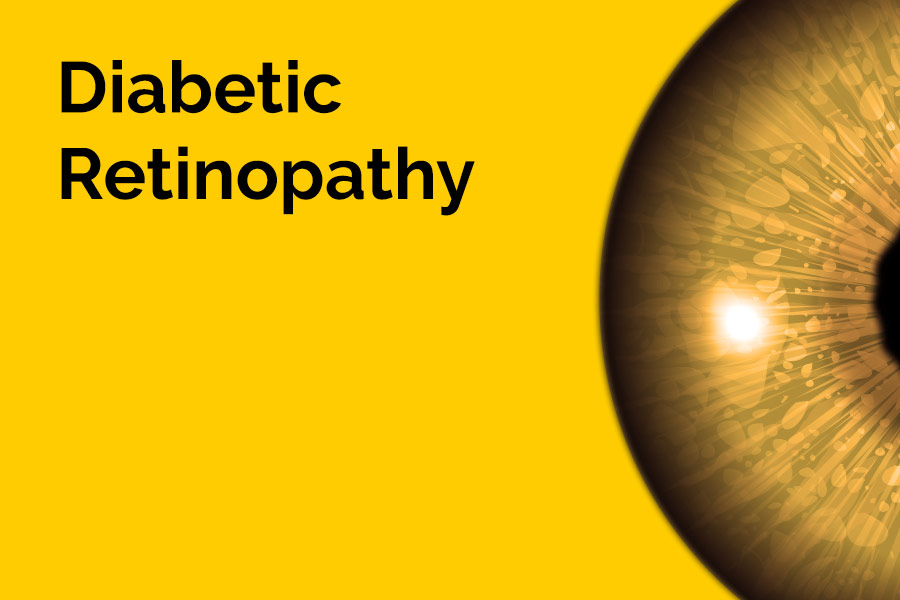Diabetic Retinopathy
Diabetic retinopathy is a complication of diabetes, caused by high blood sugar levels damaging the retinal blood vessels. Diabetic retinopathy occurs when the tiny blood vessels, in the back of your eyes, leak blood and other fluids. This causes the retinal tissue to swell, resulting in cloudy or blurred vision. The condition usually affects both eyes. The longer a person has diabetes, the more likely it is that they will develop diabetic retinopathy. If left untreated, diabetic retinopathy can cause blindness.
It is estimated that one-third of people with diabetes have Diabetic Retinopathy. Over half of people with Diabetic Retinopathy don’t know that they have it, for this reason, it is essential that people with diabetes get screened regularly.
There are four main types of diabetic retinopathy, these are:
- Background retinopathy – this is stage one. Your eyesight isn’t affected yet, but you need to seek treatment to prevent the problem from getting worse.
- Non-proliferative retinopathy – stage two. The damage is more serious, and you’ll need to get your eyes screened more often to identify any changes.
- Proliferative retinopathy – stage three. There is now a high risk of losing your sight.
- Maculopathy – this is a different type of retinopathy that affects the middle of the eye, this may lead to you being unable to read or drive. You might hear this called M0 if there’s no maculopathy found in your eyes, or M1 if the fluid is starting to build-up in your eye and is affecting your sight.
Symptoms
Early on, Diabetic Retinopathy is asymptomatic (showing no symptoms), if it progresses without being treated then it may produce the following symptoms:
- gradually worsening vision
- sudden vision loss
- floating shapes in your field of vision (also known as ‘floaters’)
- blurred or patchy vision
- eye pain or redness
If you have any of these symptoms, please contact your GP immediately. If the condition is caught early, treatment can prevent or reduce vision loss.
Diagnosis, screening and tests
To check for Diabetic Retinopathy, you will need to contact your GP and receive Diabetic Eye Screening. During this screening, you’ll be given eye drops to enlarge your pupils, which takes between 15 and 20 minutes, and photographs of your retina will be taken. The eye drops may cause your eyes to sting slightly, and your vision may become blurred. You may also find it difficult to focus on objects that are close to you. Depending on the type of eye drops used, the blurring can last between two and six hours. You won’t be able to drive home from your appointment, so you may want to bring someone with you. After the screening procedure, you may also find that everything looks very bright. You may want to take a pair of sunglasses to wear afterwards. The doctor will then review the results and conclude if, or what type of, Diabetic Retinopathy is present.
Treatments
If your retinopathy is more advanced, you’ll need treatment, or you risk losing your sight completely.
The type of treatment you receive will depend on how advanced the damage is. Your doctor will be able to decide on the following treatments:
- Laser treatment – This is the most common treatment. It seals the leaks from the blood vessels, preventing more damage, however, it will not improve your sight.
- Eye injections – If you have maculopathy (swelling in the eye), you can have drug injections to treat it. These injections can slow down the damage and quickly improve your eyesight. Most people require a few injections, normally once a month.
- Steroids – If other treatments don’t work, steroids can help people with severe damage to their eyes. Steroids are drugs that can reduce inflammation, and help with any swelling in your eye.
- Eye surgery – Vitreoretinal surgery is a major procedure but may be the best course of action for advanced retinopathy.
Prevention
Although it takes several years for the retina to degrade and Diabetic Retinopathy to appear, it is still important to try and prevent this as soon as possible. Diabetics can do several things to try and prevent this from happening, such as:
- Living a healthy lifestyle – healthy, balanced diet; losing weight if you are overweight; exercising regularly; stopping smoking if you smoke; not exceeding the recommended alcohol limits.
- Monitoring your blood sugar, blood pressure and cholesterol levels – GP guidance for this
- Attending Regular screenings – even if you think your diabetes is well controlled, still important to attend your annual diabetic eye screening appointment.
